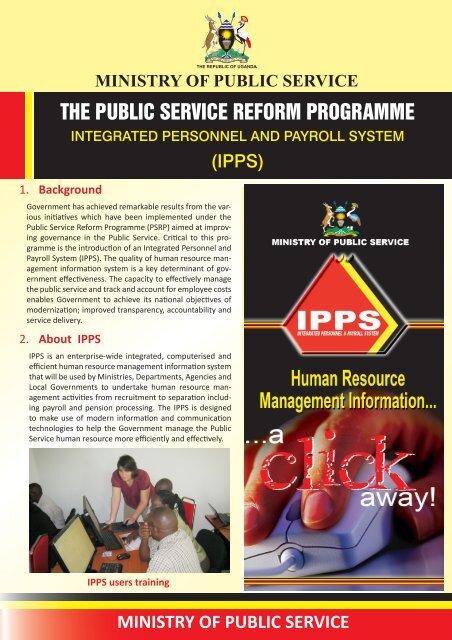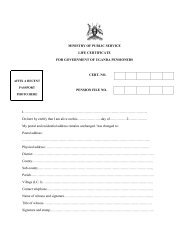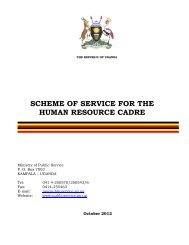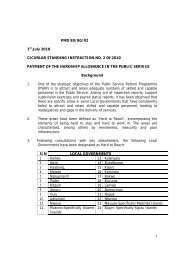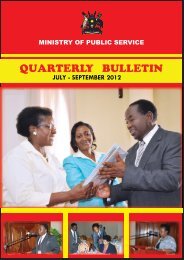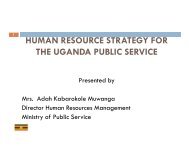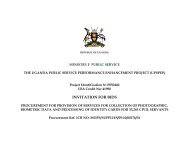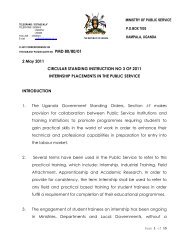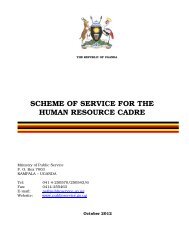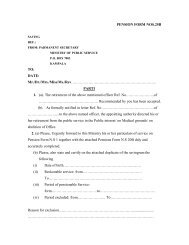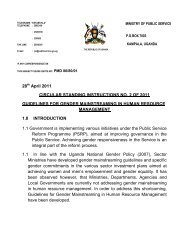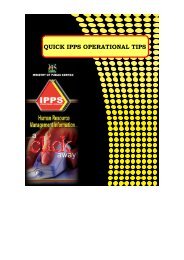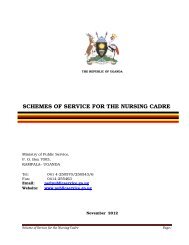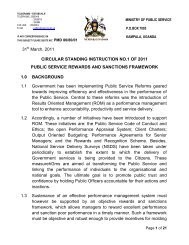THE PUBLIC SERVICE REFORM PROGRAMME - Ministry of Public ...
THE PUBLIC SERVICE REFORM PROGRAMME - Ministry of Public ...
THE PUBLIC SERVICE REFORM PROGRAMME - Ministry of Public ...
- No tags were found...
You also want an ePaper? Increase the reach of your titles
YUMPU automatically turns print PDFs into web optimized ePapers that Google loves.
<strong>THE</strong> <strong>PUBLIC</strong> <strong>SERVICE</strong> <strong>REFORM</strong> <strong>PROGRAMME</strong>1. BackgroundMINISTRY OF <strong>PUBLIC</strong> <strong>SERVICE</strong>INTEGRATED PERSONNEL AND PAYROLL SYSTEMGovernment has achieved remarkable results from the variousinitiatives which have been implemented under the<strong>Public</strong> Service Reform Programme (PSRP) aimed at improvinggovernance in the <strong>Public</strong> Service. Critical to this programmeis the introduction <strong>of</strong> an Integrated Personnel andPayroll System (IPPS). The quality <strong>of</strong> human resource managementinformation system is a key determinant <strong>of</strong> governmenteffectiveness. The capacity to effectively managethe public service and track and account for employee costsenables Government to achieve its national objectives <strong>of</strong>modernization; improved transparency, accountability andservice delivery.2. About IPPSIPPS is an enterprise-wide integrated, computerised andefficient human resource management information systemthat will be used by Ministries, Departments, Agencies andLocal Governments to undertake human resource managementactivities from recruitment to separation includingpayroll and pension processing. The IPPS is designedto make use <strong>of</strong> modern information and communicationtechnologies to help the Government manage the <strong>Public</strong>Service human resource more efficiently and effectively.(IPPS)IPPS users trainingMINISTRY OF <strong>PUBLIC</strong> <strong>SERVICE</strong>
3. The objectives <strong>of</strong> implementingthe IPPSa) To meet the Government requirements for strengthenedaccountability and control by improving themanagement <strong>of</strong> the public service workforce andenhancing payroll and pension controls.b) To improve the quality <strong>of</strong> human resource informationavailable to decision makers within the <strong>Public</strong>Service by implementing modern (world-class)systems that will support the information requirements<strong>of</strong> Government.c) To drive efficiency and consistency in payroll, HRprocessing, reporting and standardize pay andbenefits business processes.d) To reduce duplication, paper flow and manual adjustments.4. The key features <strong>of</strong> IPPSThe FreeBalance enterprise resource planning(ERP) s<strong>of</strong>tware purchased by the Government hasthe following functionalities:a) Human resources to support, recruitmentand selection; performance management,establishment control, promotion, and leavemanagement.b) Payroll and Pensionsc) Benefits and self-service including accumulatedbenefits management; travel and subsistence;and the self-service portal.5. Expected benefits <strong>of</strong> IPPS?IPPS will enable Government <strong>of</strong> Uganda to carry out thefollowing;a) Develop processes that maximizes employee Contributions,recruit, develop and train employeeswith the right skills and competences needed tomatch the Changing demands <strong>of</strong> the business.b) Manage an increasingly diverse workforce with differentcareer aspirations Design, implement andmanage reward and performance review systemsto enhance performance <strong>of</strong> staff.c) Carry out human resource planningd) Adopt best Human Resource practices.e) Improve transaction processing through real timeprocessing <strong>of</strong> HR transactions.f) Have better system controls and accountability.g) Allow for better analysis and take faster decisionsh) Provide early alerts to action Officers at variousstages <strong>of</strong> the HR processesi) Improve reporting capability in terms <strong>of</strong> the numberand variety <strong>of</strong> Human Resource-related reports .IPPS count flyers being delivered to <strong>Ministry</strong> <strong>of</strong> Health <strong>of</strong>ficialsMINISTRY OF <strong>PUBLIC</strong> <strong>SERVICE</strong>
6. The expected benefits <strong>of</strong> IPPS to<strong>Public</strong> Officersa) HR job will be made easier.b) <strong>Public</strong> Officers will be able to:i) apply for leave, training and promotion right inIPPS;ii)iii)iv)have access to their e-personal file;access the active and pensioner’s payrollsfaster;automatically be transferred from the activeto the pensioner’s payrolls;v) Individual Officers will have access to the IPPSto update their update their own bio-datawhere they are authorised to do so But theywill not have access to update some fields likedate <strong>of</strong> birth and dates <strong>of</strong> appointments.7. IPPS Implementation ModalitiesThe IPPS will be implemented in a phased manner. Thefirst phase will be the pilot phase (1 July 2010 to 30June 2011) and a rollout implementation (Phases 2 to5 i.e. from 1 July 2011 to 30 June 2015). At the end<strong>of</strong> these phases, the IPPS will have been implementedacross all Ministries, Departments, Agencies and LocalGovernments.8. The IPPS Pilot Phasea) The IPPS Pilot Sites are eleven (11): four (4)Ministries; four () () 4) National ational ational Service Commissions;one (1) Department and two (2) LocalGovernments namely:i) <strong>Ministry</strong> <strong>of</strong> Healthii)iii)iv)<strong>Ministry</strong> <strong>of</strong> Finance, Planning and EconomicDevelopment<strong>Ministry</strong> <strong>of</strong> Education and Sports<strong>Ministry</strong> <strong>of</strong> <strong>Public</strong> Servicev) Health Service Commissionvi)vii)viii)ix)Education Service Commission<strong>Public</strong> Service CommissionJudicial Service CommissionJudiciaryx) Jinja District Local Governmentxi)Lira District Local Governmentb) The current payroll and pension data will be transferredto the IPPS during the pilot phase.c) The pilot sites will use the IPPS to for all the HR functionalitiesincluding payroll and pension.d) A Data Entry Bureau will be established at the <strong>Ministry</strong><strong>of</strong> <strong>Public</strong> Service where Non-IPPS sites will haveaccess to the IPPS to initially process payroll changes.e) The IPPS will utilise the <strong>Ministry</strong> <strong>of</strong> Finance, Planningand Economic Development (IFMS) infrastructureand disaster recovery facilities.9. Interoperation with OtherGovernment SystemsIPPS will exchange data/information with otherGovernment systems.These include:i) Electronic Document Management System(EDMS)ii)Uganda Peoples Defence Forces Human ResourceManagement System (UPDF HRMIS)iii) Payroll Deduction Management System(PDMS)iv)Education Management System (EMIS)v) Human Resources for Health InformationSystem (HRHIS)vi)Local Government Information and CommunicationSystem (LOGICS).IPPS Hardware and s<strong>of</strong>tware deliveredand installedMINISTRY OF <strong>PUBLIC</strong> <strong>SERVICE</strong>
10. Current Implementation Status <strong>of</strong> IPPS• Hardware and s<strong>of</strong>tware delivered and installed• Personal files at the 11 Pilot Sites scanned• User Acceptance Testing Successful• User Training Conducted• Data Centre Ready• Commissioning and launch <strong>of</strong> IPPS set forStatus: Green for Go-Live31 st January 2011.IPPS Data Centre Ready for CommissioningStay Informeda) Ask questionsb) Be open to new processes and proceduresc) Get trained when called upon to do sod) To learn more about IPPS :i) Read the IPPS Frequently Asked Questions available at www.publicservice.go.ugii) Email the IPPS Team at: ipps@publicservice.go.ugiii) The Help Desk Team will respond to inquiries about the IPPS on 0414-258081 or 0414- 258080MINISTRY OF <strong>PUBLIC</strong> <strong>SERVICE</strong>


